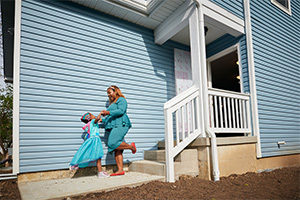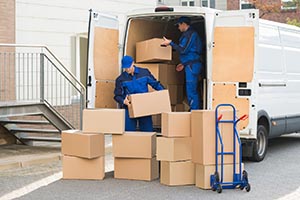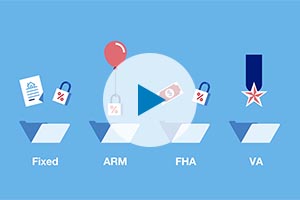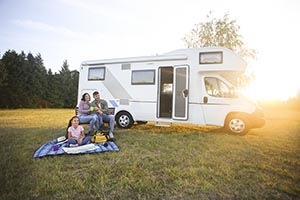
Avoiding the pitfalls of warehouse lending

Changes in credit reporting and what it means for homebuyers

What’s the difference between Fannie Mae and Freddie Mac?

Why other lenders may be reaching out to your employees

A checklist for starting a mobility program review

High-cost housing and down payment options in relocation

For today's relocating home buyers, time and money are everything

Crypto + Relo: Mobility industry impacts

How I did it: Turned my side hustle into a full-time job

Costs to consider when starting a business

How to track your spending patterns

How to manage your money: 6 steps to take

Key components of a financial plan

How to manage your finances when you're self-employed

Good money habits: 6 common money mistakes to avoid

Transitioning from the military to the civilian workforce

How to Adult: 5 ways to track your spending

Preparing for adoption and IVF

11 essential things to do before baby comes

Closing on a house checklist for buyers

Webinar: Uncover the cost: Starting a family

Family planning for the LGBTQ+ community

Checklist: 10 questions to ask your home inspector

College budgeting: When to save and splurge

Webinar: Uncover the cost: College diploma

How to gain financial independence from your parents

How to save money in college: easy ways to spend less

Practical money skills and financial tips for college students

Tips for handling rising costs from an Operation HOPE Financial Wellbeing coach

3 ways to keep costs down at the grocery store (and make meal planning fun)

5 tips for creating (and sticking to) a holiday budget

Financial checklist: Preparing for military deployment

Is it cheaper to build or buy a house?

Should you buy now, pay later?

6 pandemic money habits to keep for the long term

5 things to consider when deciding to take an unplanned trip

Working with an accountability partner can help you reach your goals

The mobile app to download before summer vacation

How to decide when to shop local and when to shop online

How I kicked my online shopping habit and got my spending under control

Growing your savings by going on a ‘money hunt’

Webinar: Smart habits and behaviors to achieve financial wellness

A who’s who at your local bank

Your 4-step guide to financial planning

How to stay financially focused in the face of economic uncertainty

How I did it: Learned to budget as a single mom

What military service taught me about money management

Webinar: Common budget mistakes (and how to avoid them)

Webinar: Uncover the cost: Wedding

Adulting 101: How to make a budget plan

Allowance basics for parents and kids

Helpful tips for safe and smart charitable giving

Webinar: Mindset Matters: How to practice mindful spending

How to save money while helping the environment

You can take these 18 budgeting tips straight to the bank

How to manage money in the military: A veteran weighs in

How can I help my student manage money?

U.S. Bank asks: Do you know what an overdraft is?

Stay on budget — and on the go — with a mobile banking app

U.S. Bank asks: Do you know your finances?

Do you and your fiancé have compatible financial goals?

How to best handle unexpected expenses

Save time and money with automatic bill pay

U.S. Bank asks: Transitioning out of college life? What’s next?

Personal finance for teens can empower your child

Don’t underestimate the importance of balancing your checking account

9 simple ways to save

How to save for a wedding

It's possible: 7 tips for breaking the spending cycle

Here’s how to create a budget for yourself

Multiple accounts can make it easier to follow a monthly budget

7 steps: How couples and single parents can prepare for child care costs

Dear Money Mentor: How do I set and track financial goals?

Tips for working in the gig economy

Lost job finance tips: What to do when you lose your job

Tips to raise financially healthy kids at every age

Money management guide to financial independence

30-day adulting challenge: Financial wellness tasks to complete in a month

7 financial questions to consider when changing jobs

What’s in your emergency fund?

Certificates of deposit: How they work to grow your money

What I learned from my mom about money

Practical money tips we've learned from our dads

What financial advice would you give your younger self?

How to increase your savings

Financial gifts can be a valuable – and fun – choice for the holidays

Consolidating debts: Pros and cons to keep in mind

What’s a subordination agreement, and why does it matter?

Know your debt-to-income ratio

Understanding the true cost of borrowing: What is amortization, and why does it matter?

Your quick guide to loans and obtaining credit

How to use your unexpected windfall to reach financial goals

Is it cheaper to build or buy a house

Overcoming high interest rates: Getting your homeownership goals back on track

For today's homebuyers, time and money are everything

How I did it: Bought my dream home using equity

Buying a home Q&A: What made three homeowners fall in love with their new home

Should you buy a house that’s still under construction?

Crypto + Homebuying: Impacts on the real estate market

Preparing for homeownership: A guide for LGBTQ+ homebuyers

How I did it: Built living spaces to support my family

Your guide to breaking the rental cycle

What are conforming loan limits and why are they increasing

Webinar: Uncover the cost: Building a home

Community activist achieves dream of homeownership

Checklist: 6 to-dos for after a move

Military homeownership: Your guide to resources, financing and more

Spring cleaning checklist for your home: 5 budget-boosting tasks

Bringing economic opportunity to underserved communities one home at a time

Saving for a down payment: Where should I keep my money?

How I did it: Bought a home without a 20 percent down payment

Home buying myths: Realities of owning a home

Are professional movers worth the cost?

Money Moments: Tips for selling your home

The lowdown on 6 myths about buying a home

Get more home for your money with these tips

First-time homebuyer’s guide to getting a mortgage

4 ways to free up your budget (and your life) with a smaller home

Dear Money Mentor: When should I refinance a mortgage?

Quiz: How prepared are you to buy a home?

Beyond the mortgage: Other costs for homeowners

How you can take advantage of low mortgage rates

Webinar: Mortgage basics: What is refinancing, and is it right for you?

What is an escrow account? Do I have one?

Webinar: Mortgage basics: How much house can you afford?

Webinar: Mortgage basics: Prequalification or pre-approval – What do I need?

Is it the right time to refinance your mortgage?

What is refinancing a mortgage?

What to know when buying a home with your significant other

Webinar: Mortgage basics: What’s the difference between interest rate and annual percentage rate?

Webinar: Mortgage basics: 3 Key steps in the homebuying process

How do I prequalify for a mortgage?

Webinar: Mortgage basics: Finding the right home loan for you

Webinar: Mortgage basics: Buying or renting – What’s right for you?

Webinar: Mortgage basics: How does your credit score impact the homebuying experience?

4 questions to ask before you buy an investment property

8 steps to take before you buy a home

6 questions to ask before buying a new home

Webinar: Uncover the cost: Home renovation

Improving your credit score: Truth and myths revealed

Test your loan savvy

6 essential credit report terms to know

What types of credit scores qualify for a mortgage?

How I did it: Deciding whether to buy an RV


